
Kézbesítés
Vásárlási tanácsadó





Nem vált be? Semmi gond! Nálunk 30 napon belül visszaküldheti
 Ajándékutalvány
bármilyen értékben
Ajándékutalvány
bármilyen értékben
Ajándékutalvánnyal nem nyúlhat mellé. A megajándékozott az ajándékutalványért bármit választhat kínálatunkból.
Producing Modernity in Mexico
 Angol
Angol
 475 b
475 b
30 nap a termék visszaküldésére
Ezt is ajánljuk


Race, ethnicity and gender played an important role in the complex relationship between export agriculture, labour and state power in Chiapas during the regime of Porfirio Diaz (1876-1914). This case study of tropical plantation development and a major regional study of modern Mexico analyses the politics of state-building and the history of land tenure and rural labour in the state of Chiapas in the period leading up to the outbreak of Revolution in 1910. The book also contributes to the growing history of indigenous peoples in Latin America, examining the changing relationship between Indian groups and non-Indian governments and economic interests in Chiapas during the nineteenth century. In so doing, it addresses questions of tradition, modernity, national state-building, globalisation and the development of capitalism in Latin America. The book argues that colonial caste identities and relations were no impediments to modernisation. Instead, they were modified by liberalism, reinterpreted through the lenses of positivism and scientific racism, and managed through an increasingly centralised state apparatus. Indian communities emerge, then, not solely as oppressed and marginalised, but as an integral part of increasingly centralised state power and as institutions through which growing demands for labour and taxes could be made. Debt peonage, too, was upheld by the liberal state, sanctioned by the law as a natural everyday relationship, and buttressed by traditional patriarchy and gender relationships. Thus, in Chiapas the Porfirian regime recycled and redeployed pre-existing social and political relations, reinventing tradition to serve the purposes of modernisation and progress. Linked to the twin processes of export development and national state-building were racism, the spread of coercive debt peonage, the increasing politicisation of land tenure, camarilla politics, caciquismo and growing regional divisions, which contributed to rising levels of social and political conflict prior to the arrival of northern revolutionary troops in Chiapas in 1914.
Információ a könyvről
 Angol
Angol
Kategória




 Hogyan vásároljunk
Hogyan vásároljunk


























